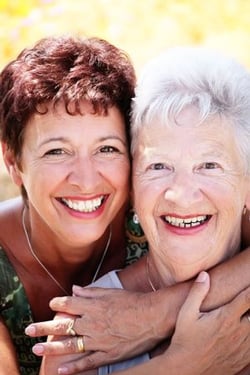 As an adult, you appreciate how well your parents took care of you when you were a child. Now that they are growing older, you want to do the same for them. You've read enough about caregiving to know that caring for an aging parent will have a profound effect on your life, but as every family has a different experience, you're still not quite sure what to expect.
As an adult, you appreciate how well your parents took care of you when you were a child. Now that they are growing older, you want to do the same for them. You've read enough about caregiving to know that caring for an aging parent will have a profound effect on your life, but as every family has a different experience, you're still not quite sure what to expect.
Elder care has a real and measurable effect on families in the United States. While you can't predict the exact effect this future of caregiving will have on your life and your family, a look at some national statistics may help you feel more prepared to take on this role-- if and when that day should come.
As an Eldercare Provider, You are Not Alone
First, you should know that many others struggle with the same problems and decisions facing you today. According to the Family Caregiver Alliance, there are more than 65 million caregivers, which this group defines broadly as an unpaid person involved in helping another with an activity of daily living or a medical task, in the United States. 43 million of these caregivers provide care for adults aged 50 and older -- nearly 15 million for individuals with a form of dementia like Alzheimer’s disease.
As an adult child, you should know that taking care of an aging parent is long, hard work. In an average month, the caregiver spends 13 days doing the shopping, preparing meals, performing housekeeping and laundry duties, providing transportation and giving medication. They spend another six days a month assisting an elderly adult with feeding, dressing and grooming, walking, bathing, and assistance with going to the toilet.
The eldercare you provide has significant economic value. Economists say caregivers provided $450 billion in services in 2009, making the value of unpaid caregivers an incomparable source of long-term care services.
The Caregiver Gender Gap
Most of these caregivers are women (about 66 percent) -- although the men of America have begun taking on more of the responsibilities -- and as members of the “Sandwich Generation,” roughly a third provide care for more than one person, a commitment that can take a toll on home life and career ambitions.
At an age where at least one child is still at home, these caregivers often find themselves pulling double duty, caring for that children as well as aging parents which takes its toll on American families in a variety of ways. Financial resources once devoted to children or parents now cover medical expenses for a grandparent. A Sandwich Generation parent has less time to spend with his children; this often occurs during the child’s teenage years, which are always taxing for parents and children.
The average age of a female caregiver is 48, which is usually the time when a woman is reaching the peak of her career or working towards retirement. And these women often find that they must stop working or reduce their work hours in order to take care of an aging parent.
Communication is Key
Every adult child, including you, should know how to open lines of communication with parents, siblings, and the healthcare team providing medical care to your parents -- even before they need such care. Learn to talk openly about your parents’ wishes while they grow older.
Have a conversation about any plans they have made for their future and discuss any decisions they have yet to make. Determine where they want to live, who they want to live with, and whether they desire advanced life support in the event of death. Ask them to put it on paper with a Living Will or Advance Health Care Directive.
Making these decisions ahead of time reduces confusion, indecision, guilt, and discord between family members. Your discussions may teach you everything you need to know to make the right decisions for your parents when the time comes.













